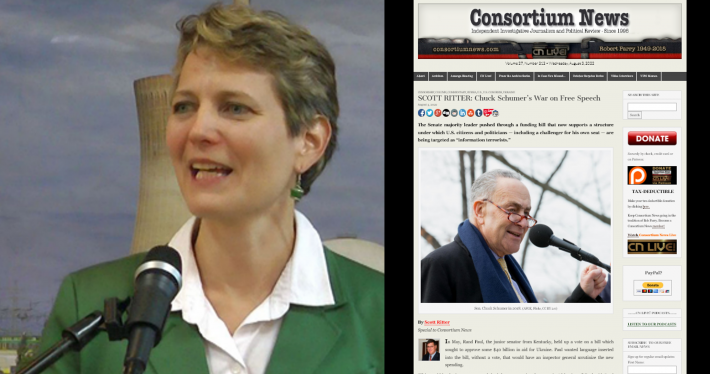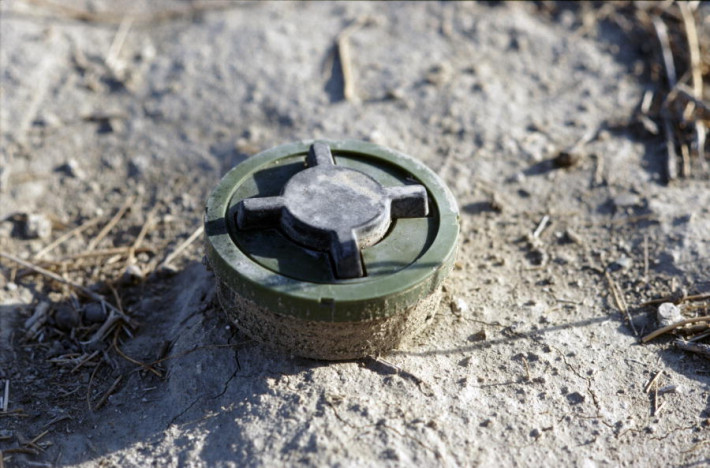by Helga Zepp-LaRouche
No, not sleepwalking, but rather with eyes wide open, and without reason, backbone or conscience, the trans-Atlantic Establishment is pushing us to the edge of the cliff, beyond which a thermonuclear Hell is lurking, that threatens to annihilate all life on this planet. The 12-point program for a diplomatic solution to the strategic crisis between NATO and Russia, released by China on February 24, represents a possible last-minute lifeline to save us from jumping off. Although it was rejected out-of-hand by President Biden and the EU Commission, it has been increasingly supported for good reason by nations of the Global South, and consequently by most of humanity. It definitely needs to become an integral focus of all those forces worldwide that, in this time of existential threat for humanity, are committed to a diplomatic solution to the Ukraine conflict. It also represents a concrete option around which to orient the offer of Pope Francis to use the Vatican as a venue for peace negotiations.
The reason why China’s peace plan was immediately rejected by the United States and NATO is that their goal is the restoration of a unipolar world in which China would never be allowed to play the role of a broker for peace. As NATO Secretary General Jens Stoltenberg made clear Feb. 28, in his joint press conference with Finnish Prime Minister Sanna Marin in Helsinki, he sees Ukraine’s future as a part of the EU and as a member of NATO (in the long run). Thus, for NATO, the option of a neutral Ukraine is off the table, although the NATO leadership knows perfectly well that Russia considers that a blatant disregard of its demand for security guarantees. In other words, the U.S., the UK, NATO and the Atlanticists defend the line: “Ukraine has to win on the battlefield,” and “Russia must be ruined.” Conversely, Russia naturally sees this as an existential threat, and will attempt to bring about a decision on the battlefield.
The Russian government would be in a parallel universe if it did not take seriously the proposals discussed at a joint event of the Jamestown Foundation and the Hudson Institute in December 2022, concerning options for a complete breakup of the Russian Federation. Their “minimalist” goal is for Russia to be turned into “a looser, confederation-type administrative political structure”—de facto disempowering the Russian government, while the “maximalist” goal is the complete breakup and partition of Russia “along ethno-religious lines” and the simultaneous creation of separate states such as Chechnya, Dagestan, and Tatarstan. In that case, they say, demilitarization comparable to the Morgenthau Plan proposal, a “de-Sovietization,” would have to be carried out, and broad sections of society would have to be brought before a war crimes tribunal or re-educated.
Since the collaborators of these two think tanks are recruited from the inner core of the U.S. intelligence agencies and the military-industrial complex, i.e., the real U.S. power structure, Moscow must assume that these scenarios reflect the intention of the U.S. government. That, in turn, would fulfill the condition that the Russian military doctrine has set for the use of nuclear weapons, i.e., when the territorial existence of Russia is threatened.
According to experts from several nations, a military victory for Ukraine is far away. Ukrainian troops have suffered huge losses, averaging 1,000 men per day over the past three months and around 500 per day since mid-February. Some 10 million refugees—two million of them in Russia—unanimously say they do not want to return to Ukraine. Overall, the Ukrainian population has dropped from 37.5 million to about 20 million at present. Almost half of the urban infrastructure has been destroyed, while all critical industrial capacity is located in Russian-speaking regions.
In such circumstances, a war of attrition lasting many years, as the amount of weapons ordered by NATO would seem to indicate, will be a meat grinder in which the population will be wiped out “to the last Ukrainian.”
While U.S. military officials such as Chairman of the Joint Chiefs of Staff Mark Milley are pushing for negotiations based on a realistic assessment of the situation, and even the Rand Corporation has advised against a “long war” in Ukraine for its own reasons, the hawks around the State Department are apparently following the proposal made by one of Britain’s leading think tanks, the Royal United Services Institute (RUSI), which advocates escalating the war to the point where Russia would have to threaten to use nuclear weapons because of a threat to Crimea and thus to Russian territory. According to this perverse logic, the ensuing “Cuban Missile Crisis on steroids” would “promote” the settlement of the war because Russia could thus be forced to surrender. U.S. Under Secretary of State for Political Affairs, Victoria “Dr. Strangelove” Nuland, notorious for her active role in the 2014 Maidan coup in Kiev, recently reiterated her support for Ukrainian military attacks on Crimea. Thus, the danger of an escalation to a global nuclear war in the short term is knowingly accepted. Obviously, the lives of the Ukrainian population do not count in this scenario; the sole goal is to ensure the defeat of Russia in order to re-establish the status of American hegemony.
The European Council for Foreign Relations, the EU’s own think tank, points out in a recent study that although the U.S. and Europe have drawn closer to one another, the rest of the world is moving further and further away from the West. Those who wish to get an idea of this reality for themselves are advised to watch the video of a dialogue between Russian Foreign Minister Sergey Lavrov and the head of the Indian think tank ORF (Observer Research Foundation), Sunjoy Joshi, at this year’s Raisina Dialogue. A good representation of the Global South’s elite meets regularly at this prestigious event sponsored by the Indian government. As Lavrov, among others, indicated, the Russia-India-China troika, first initiated by Russian Foreign Minister Primakov, continues to be a centerpiece of strategic cooperation, but has since greatly expanded into the BRICS Plus group, to which two dozen other countries of the Global South have applied for membership. Therefore, Russia is hardly isolated, as this includes an overwhelming majority of humanity.
And this majority supports the Chinese peace proposal, which calls for respecting the sovereignty and territorial integrity of all countries, abandoning a Cold War mentality, ending hostilities, ending sanctions against Russia, and proposes concrete steps on how to overcome the crisis diplomatically. President Zelensky has also stated that he wants to discuss this with President Xi. The near-hysterical reactions of the mainstream media and the Atlanticists to the Chinese proposal prove once again that ideological glasses cause blindness.
The majority of the world’s population supports a diplomatic solution to the crisis. Brazilian President Lula, who has called for a peace club composed of the nations of the Global South, will travel to China later this month to discuss peace initiatives with Xi Jinping. Italian General Fabio Mini, former commander of the KFOR mission in Kosovo, has proposed further useful steps for a settlement of the conflict in Ukraine. Pope Francis’ offer to use the Vatican as a venue for diplomatic negotiations is gaining support from key individuals and institutions around the world, as well as religious leaders of various denominations.
Therefore, it is high time for China’s proposal to become the center of the discussion. The situation today is comparable to that in which the negotiations leading to the Peace of Westphalia ended 150 years of religious war in Europe. At that time, the warring parties came to the conclusion that the war had to come to an end, otherwise there would be no one left to enjoy a victory because everyone would be dead. That is precisely our situation today, with the difference that the existence of nuclear weapons today would guarantee such an outcome.
One of the most important results of the Peace of Westphalia, which laid the foundation for international law, was the realization that peace requires taking into account the interest of the other. From that standpoint, not only is NATO’s repeated eastward expansion a catalyst for war, NATO itself is obsolete and urgently needs to be replaced by a new international security and development architecture that takes into account the interests of all states on the planet.
It is urgently necessary that the newly emerging peace movement, that came onto the scene at the “Rage Against the War Machine” demonstration on Feb. 19 in Washington, on Feb. 25 in Berlin, and in many other rallies in Italy, France, Germany and numerous other countries, take a clear position in favor of ending NATO and supporting the Chinese proposal for a peaceful settlement to the conflict which otherwise threatens to lead to the end of civilization.
zepp-larouche@eir.de


















